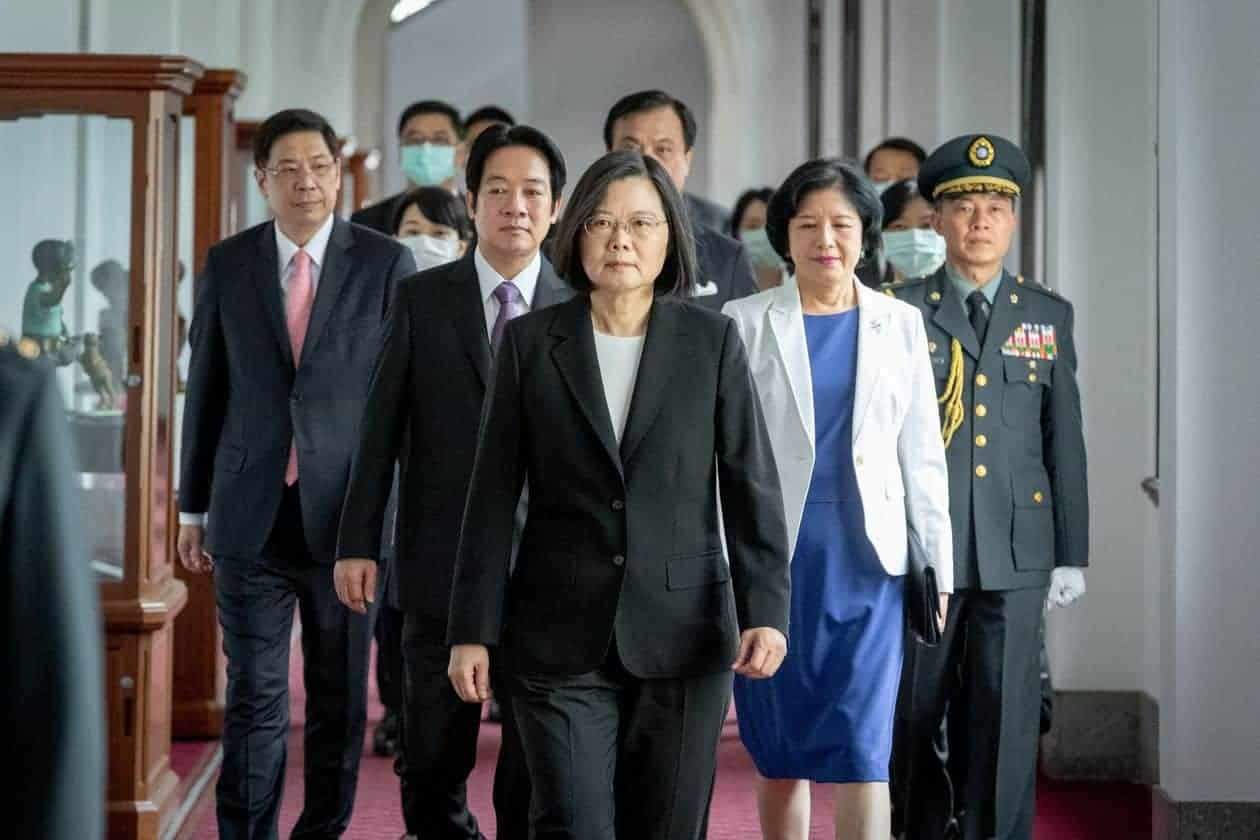Taiwan’s President Renews Call to Hold Firm Against Chinese Pressure

Taiwan President Tsai Ing-wen kicked off her second term by doubling down on her strategy for boosting the island democracy’s ability to resist coercion from China, pledging to further revamp the economy, strengthen the military and deepen ties with friendly countries.
In her inaugural address on Wednesday, Ms. Tsai reiterated Taiwan’s rejection of China’s efforts to assimilate the island, which Beijing claims as its territory. But she offered to work with Chinese leader Xi Jinping to stabilize relations in ways that respect Taiwan’s democracy and sovereignty—conditions that China has previously rejected.
“Both sides have a duty to find a way to coexist over the long term and prevent the intensification of antagonism and differences,” Ms. Tsai said.
Ms. Tsai won re-election by a landslide in January on a pitch to defend Taiwan’s democracy by enlarging the island’s international presence and reducing its economic dependence on mainland China, its biggest trading partner.
Taiwan’s standout success in fighting the Covid-19 pandemic has bolstered the profile of the island of nearly 24 million people, a boon for Ms. Tsai’s agenda. Taiwanese authorities had reported 440 coronavirus infections and seven deaths as of Wednesday.
China’s Taiwan Affairs Office rejected Ms. Tsai’s conditions for dialogue, saying she and her ruling party, which advocates a Taiwanese identity separate from China, have antagonized Beijing by refusing to acknowledge that Taiwan and the mainland are part of “one China.”
“We definitely won’t leave any space for separatist activities seeking ‘Taiwan independence’ in any form,” the office said in a statement responding to her speech.
The exchange underscores the fraught nature of ties between China and Taiwan, which have plunged to new depths in recent months as each side accused the other of exploiting the coronavirus pandemic for political gain.
In Taiwan, public resentment against China simmered as Ms. Tsai’s government complained about Beijing using its influence at the World Health Organization to exclude Taipei from the United Nations health agency’s annual policy-setting assembly and many of its technical meetings. Beijing has criticized Taipei’s efforts to participate in WHO activities as an attempt to assert independence.
Ms. Tsai’s speech indicates that she is content to maintain the current state of relations with Beijing while she focuses on her domestic and foreign-policy agenda, said Yen Chen-shen, an international-relations researcher at the National Chengchi University in Taiwan.
“She’s essentially trying to avoid creating new problems for Beijing and not give them any excuse for using force against Taiwan,” but she isn’t likely to make concessions to improve ties, Mr. Yen said.
Tensions have simmered since Ms. Tsai first took office in 2016, beating out her main rival from the Nationalist Party, or Kuomintang, which was advocating friendlier ties with China. Beijing sought to pressure her administration, sending warplanes and naval vessels to circle the island during military exercises, curbing Chinese travel to Taiwan, poaching Taipei’s diplomatic allies and curtailing the island’s participation in international organizations.
Such pressure seeded indignation among many Taiwanese—sentiment that helped Ms. Tsai secure a record tally of nearly 8.2 million votes during January’s presidential election.
Opinion polls suggested that Ms. Tsai’s victory stemmed in large part from widespread sympathies for anti-Beijing protesters in Hong Kong, which China governs under the “one country, two systems” framework of partial autonomy. The Communist Party has proposed using this framework to assimilate Taiwan.
“We will not accept the Beijing authorities’ use of ‘one country, two systems’ to downgrade Taiwan and undermine the cross-strait status quo,” Ms. Tsai said in her speech Wednesday.
The opposition Nationalist Party echoed Ms. Tsai’s rejection of the “one country, two systems” formula but blamed her for souring relations with Beijing. “In today’s speech, we also can’t see any future plans for rebuilding mutual trust across the Taiwan Strait,” Nationalist Party Chairman Johnny Chiang said.
In her address, Ms. Tsai committed to pursuing trade pacts and other cooperation with the U.S., Japan and European countries, while spurring industrial development in sectors like medical technology, cybersecurity and renewable energy.
She also said she would strengthen Taiwan’s defenses, including its ability to wage asymmetric warfare.
Ahead of Ms. Tsai’s speech, guests at the inauguration ceremony were shown congratulatory messages from Taiwan’s diplomatic allies and political dignitaries from friendly countries, including U.S. Secretary of State Mike Pompeo.
“The United States has long considered Taiwan a force for good in the world and a reliable partner,” Mr. Pompeo said in a statement, read aloud by a Taiwanese official. “I am confident that, with President Tsai at the helm, our partnership with Taiwan will continue to flourish.”
U.S. deputy national security adviser Matt Pottinger separately contributed a video message, delivered in Mandarin, that was laced with thinly veiled snipes at China’s Communist leadership. “Taiwan has shown the world that the spirit of freedom and democracy aren’t just ‘American’ or ‘Western,’ but are also universal,” he said.
Mr. Pottinger made a pointed reference to Chinese astrophysicist and dissident Fang Lizhi, who was accused by the Communist Party of fanning a wave of student unrest in China that culminated in the 1989 pro-democracy protests on Tiananmen Square.
“Democracy, like physics, can’t be divided between ‘Eastern’ and ‘Western’ types,” Mr. Pottinger said, invoking what he said was a quotation from Mr. Fang about how he studied neither “Eastern physics” nor “Western physics,” but simply physics.
The U.S. messages drew derision from Beijing. A Chinese Foreign Ministry spokesman accused Washington of having “seriously interfered in China’s internal affairs” and warned that Beijing would take “necessary countermeasures” in response.
Photo: President Tsai was inaugurated for a second term at the Presidential Office Building in Taipei on Wednesday. - TAIWAN PRESIDENTIAL OFFICE/REUTERS











